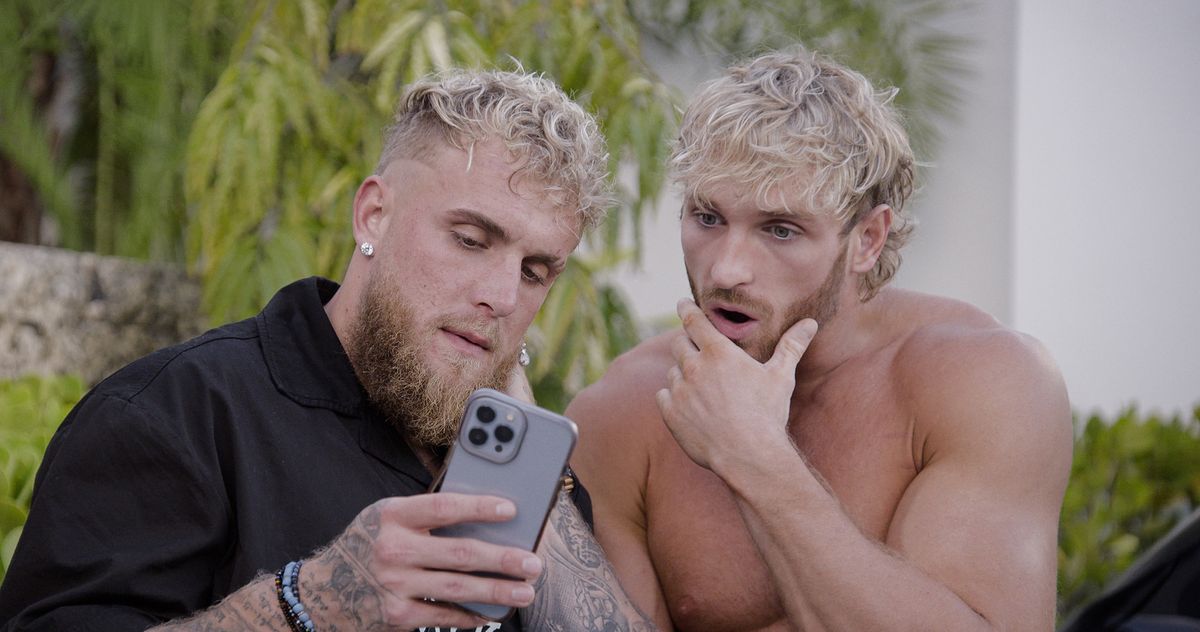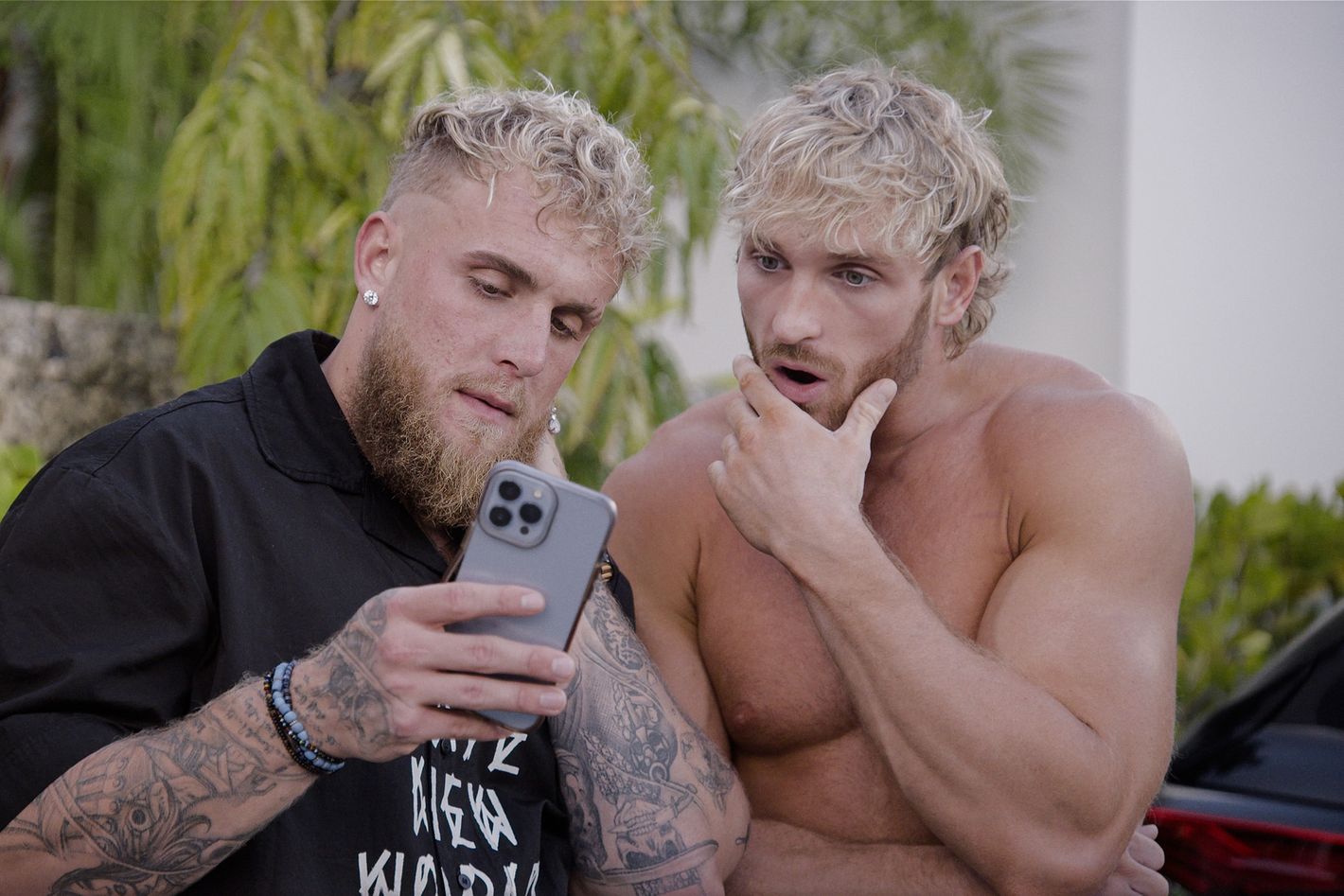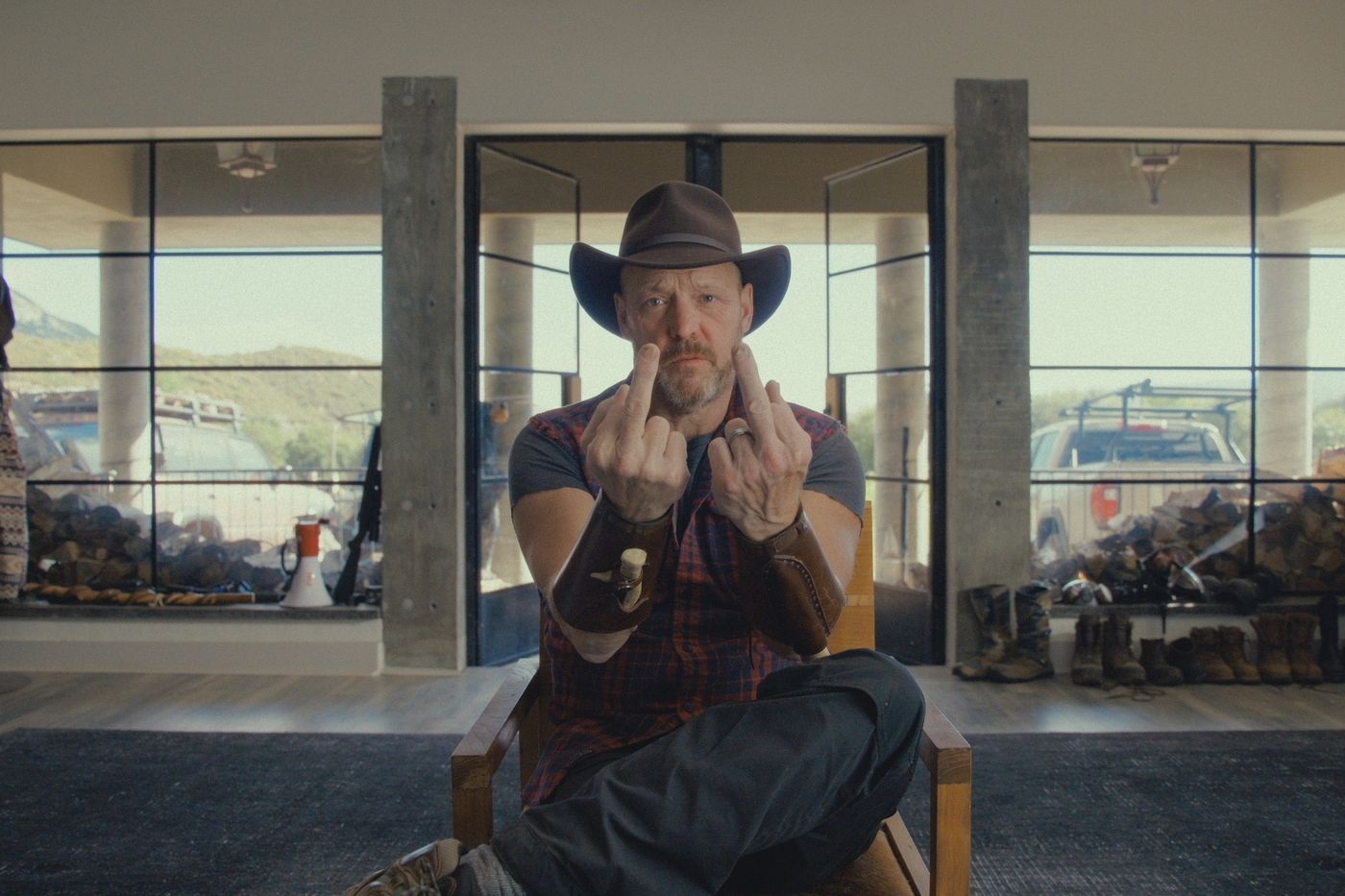Paul American Won’t Go There
Wrapping itself in a comforting blanket of “controversy,” the Paul family reality show flinches from anything resembling self-reflection.


Midway through the first episode of Paul American, the new Max reality show in which the Paul family calls themselves “controversial” over and over again like it’s their own version of summoning Candyman, influencer turned boxer Jake praises his Dutch girlfriend Jutta Leerdam’s bluntness. (They revealed their engagement this week, coincidentally just in time for the Paul American premiere.) Jutta says what she means, while “Americans are kind of fake, low-key,” Jake observes wistfully, an observation that unintentionally reflects the entire Paul American experiment.
Brothers Logan and Jake were YouTube influencers long before becoming a WWE star and heavyweight boxer, respectively, so there’s already a blurry line between their public and private personas. But the point of a reality show like this is to reveal something, anything, about the subject that we wouldn’t know otherwise. In its refusal to do so, Paul American is for the Pauls alone, who describe themselves as “the true American family” because “this is America, and we are from the heart of America.” Those are grand statements for a show that shies away from anything resembling legitimate self-reflection and seems afraid of digging into these brothers’ lives beyond their personas.
Instead, just like With Love, Meghan and The Baldwins, Paul American structures itself as a claustrophobic and curated little box, one in which its subjects repeat the same talking points about themselves ad nauseam. The actually compelling stuff that might tell us who the Pauls are when they aren’t hyperaware of the camera? That’s difficult to find in the first four episodes of Paul American that were made available to critics.
Note: This review mentions plot points from the season’s first four episodes, some of which could count as spoilers. But we’re dealing with reality TV here, so a lot of this has already been in the news.
What we see: The brothers’ competitiveness with each other
What we don’t: The brothers’ understanding of each other
“The testosterone Kardashians” is how Jake refers to himself and Logan, and the premiere episode leans on this idea that the two brothers often can’t stand each other. We get a brief explanation of how they grew apart while pursuing influencer careers in Los Angeles in their early 20s, releasing diss tracks about each other that exploded them into further popularity. Their relationship now seems frozen in place, with Jake still resentful of Logan dating one of his exes, and mother Pam alluding to how her advice for them to patch things up was initially ignored: “Why would they listen to me? They’re making lots more money than I’ve ever made.”
No one seems willing to touch the idea that it was YouTube, a forum that ties creators’ worthiness to likes and views, that both made the Pauls rich and irrevocably fucked up their relationship. Everyone talks around it, like when Jake mentions “YouTuber disease” being a “lethal drug” that helped him deal with “my traumas” (no details given of said traumas), or Logan laughing off how the two of them got in a nasty fight “right before we were pitching this exact TV show.” The Pauls claim volatility is normal for them, but when other people point out how fake it feels — like Jutta telling Jake, “You’re your character a lot … step out of it … be a real person” — they don’t have a response. Logan comes this close to self-awareness in the fourth episode, when he says, “I think that really fucks young people up, getting what they want.” But it’s hard to feel sympathetic for these two brothers stressing over the cameras “always [being] around,” as Jake says, when so much of their fighting in Paul American feels like a rehearsed extension of what they already do on YouTube or in the ring.
What we see: The brothers hustling
What we don’t: The brothers working
We see Logan and Jake working out, recording their podcasts, shilling their products, trading crypto, traveling between their numerous homes, and zooming around in Paul-branded golf carts and helicopters. We even see Jake burning money, as if Paul American needed to make it more plain that these guys are rich and destructive. But if you want any kind of glimpse into the strategy of all this, the process for the work, sorry! Paul American shows the Pauls hustling, but it doesn’t provide an understanding of the decision-making behind those hustles.
I’m not saying Paul American should show their tax returns (although … maybe), but all the brothers’ boasting makes the brief moments where they do chafe at the idea of endless work feel like surprise disclosures, which the show frustratingly doesn’t do more with. In the second episode, when Logan suggests, “There’s more to life than marketing your kids” and then looks a little despondent when his parents say in unison, “No, there’s not,” we get no follow-up, no talking-head moment with Logan and Jake reacting to their parents, who clearly got rich allowing their kids to market themselves. There’s a thread to pull on here about the brothers seemingly only finding purpose through the grind thanks to the specifically capitalist brainwashing of our click-like-and-subscribe age, but Paul American just lets it dangle.

What we see: Greg Paul being Greg Paul
What we don’t: How the family really feels about Greg Paul
The man unironically dressed like Crocodile Dundee is Greg Paul, father to Logan and Jake, who Paul American positions as an anti-liberal (but lovable!) grump: He complains about cancel culture, calls himself a “warrior” (the internet tells me he is a Realtor), accessorizes with knives, and rails against kids these days. But some of the greatest tension here is when Jake and Logan openly talk about growing up with their father’s physical abuse (which they also discussed in the 2023 Netflix documentary UNTOLD: Jake Paul the Problem Child), and some of their rare moments of solidarity come from teaming up against their dad. Take a conversation in the premiere where Logan says he and Jake had five successful pitch meetings by themselves, whereas the one that Greg attended was a disaster. (He insulted an executive when that person suggested removing Greg from the show.) That’s what should have been in Paul American! Where’s the recording of that meeting? Why didn’t the brothers exclude Greg, whom they call “a liability”? How does his presence in their lives still affect them, especially Logan, whom Greg threatens to punch in front of the whole family? Paul American doesn’t prod the brothers to go deeper.
It’s like Paul American only keeps Greg around for his outbursts. He yells “You wanna give me head?” at one of Jake’s boxing competitors. He regurgitates some right-wing culture-war bullshit to Logan about adoptive fathers having babies “sucking on their nipples.” He says stuff like, “If I could blow up all of L.A. right now with a button, I’d fucking do it in a heartbeat.” Existing Paul fans might be amused by all this, but it’s obvious that Logan and Jake have complicated feelings about their dad, and about “the shit that was happening inside the house” during their childhood, as Logan says. Paul American could have used Greg’s shock value as an avenue into brotherly insight, but instead it just uses him to advance the family brand of “controversy.”
What we see: Logan worrying about having a daughter
What we don’t: Logan addressing his history with women
When Logan’s supermodel girlfriend, Nina Agdal, surprises Logan with her positive pregnancy test in the second episode, he’s genuinely shocked: “No, you’re filming this?” he shouts. But when Logan learns he’s having a daughter, Paul American doesn’t look into why that makes him “really fucking depressed.” The series uses that statement as a cliffhanger, and then in the following episode, Logan says he’s finally “reached peace” about having a girl. How did that internal agony play out, though? We don’t know, which is especially unfulfilling, because Logan admits having a daughter “almost felt like … life karma … for how I’ve treated women.” What that treatment was doesn’t come up. Instead, we get a hedging statement from Logan about how he doesn’t “want to come across like a woke asshole, but, like, dude, women have it hard.” Again, it feels like there’s more here — maybe more about Logan’s relationship with his mom or his relationships with other female relatives — but Paul American doesn’t go there. Instead, the episode just ends with Logan saying he’s now comfortable being a girl-dad, and that’s that.
What we see: The Pauls complaining to the camera about “transgenders”
What we don’t: The Pauls having a real conversation on the subject
A clip of the brothers with Donald Trump in the premiere, and Greg’s whole vibe, are telling indicators of the Paul brothers’ political leanings. They have artwork of guns in their homes; Jake heckles Joe Biden from a Puerto Rican airstrip because Air Force One delays his own private jet’s departure; and at a March 2024 boxing event, Jake accepts an interview with Fox News. The only question we hear reporter Ryan Morik ask is about Jake’s opinion on “transgenders being in women’s sports,” which “has obviously been a hot topic” — a question Greg volunteers to answer, as Logan tries to shut down the conversation by telling Jake he wants to go home. Jake initially pretends to run away from Morik, but when he comes back, he talks about how men “should be fighting men and women should be fighting women.” Later, in their SUV leaving the venue, Jake speaks directly into the Paul American camera, while Logan nods along next to him: “Someone’s gonna die. In boxing … when a biological male kills a female, and the blood is on the hands of who? … All because they wanted some bullshit. I don’t give a fuck. Be mad at me. I’m un-cancelable.”
It’s an indecipherable answer, one full of straw-men arguments and a vague enemy “they.” It’s also a continuation of the performance Jake gave in front of cameras from conservative news outlets that are already part of his base; this is a public-facing figure giving a public-facing answer in a public-facing venue. In settling for that, Paul American fails at providing a glimpse into how the Pauls might talk about the subject when they’re alone. Paul American is particularly light on moments where the brothers actually explain their perspectives, or talk to each other or their loved ones about their “controversial” behavior or viewpoints, and this diatribe against trans people feels like another diversion. Does Logan think differently from Jake, and that’s why he grimaced at and avoided Morik’s question? How would the brothers discuss these issues with Nina or Jutta? Are Logan’s opinions on the issue changed by having a daughter? All of that is absent, and so the brothers’ politics remain flatly “traditional” in a way that doesn’t tell us anything past what their existing audience expects to hear.
What we see: Logan and Jake’s love of peeing outside
What we don’t: … Actually, that’s more than enough.
This is when Paul American gets too real.








